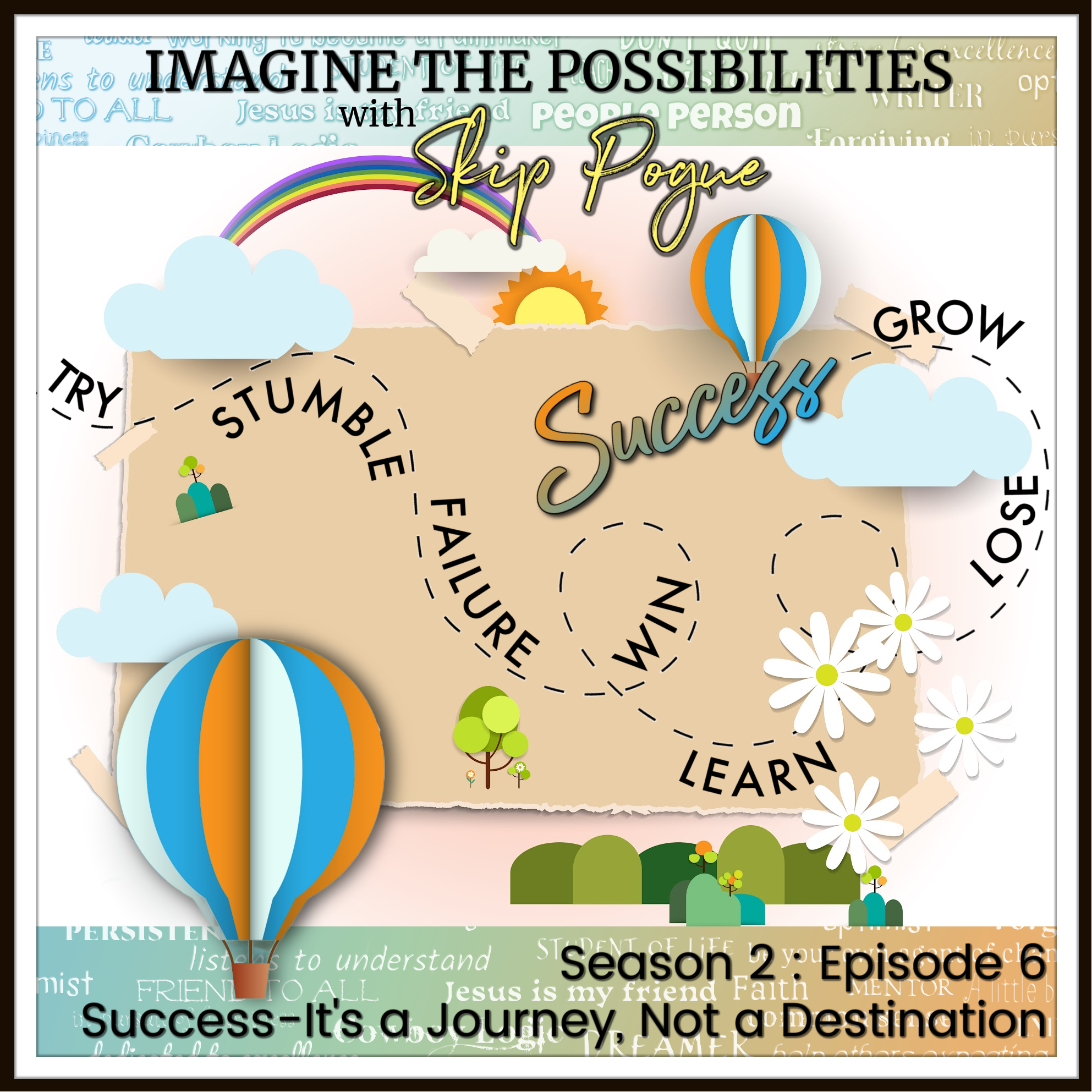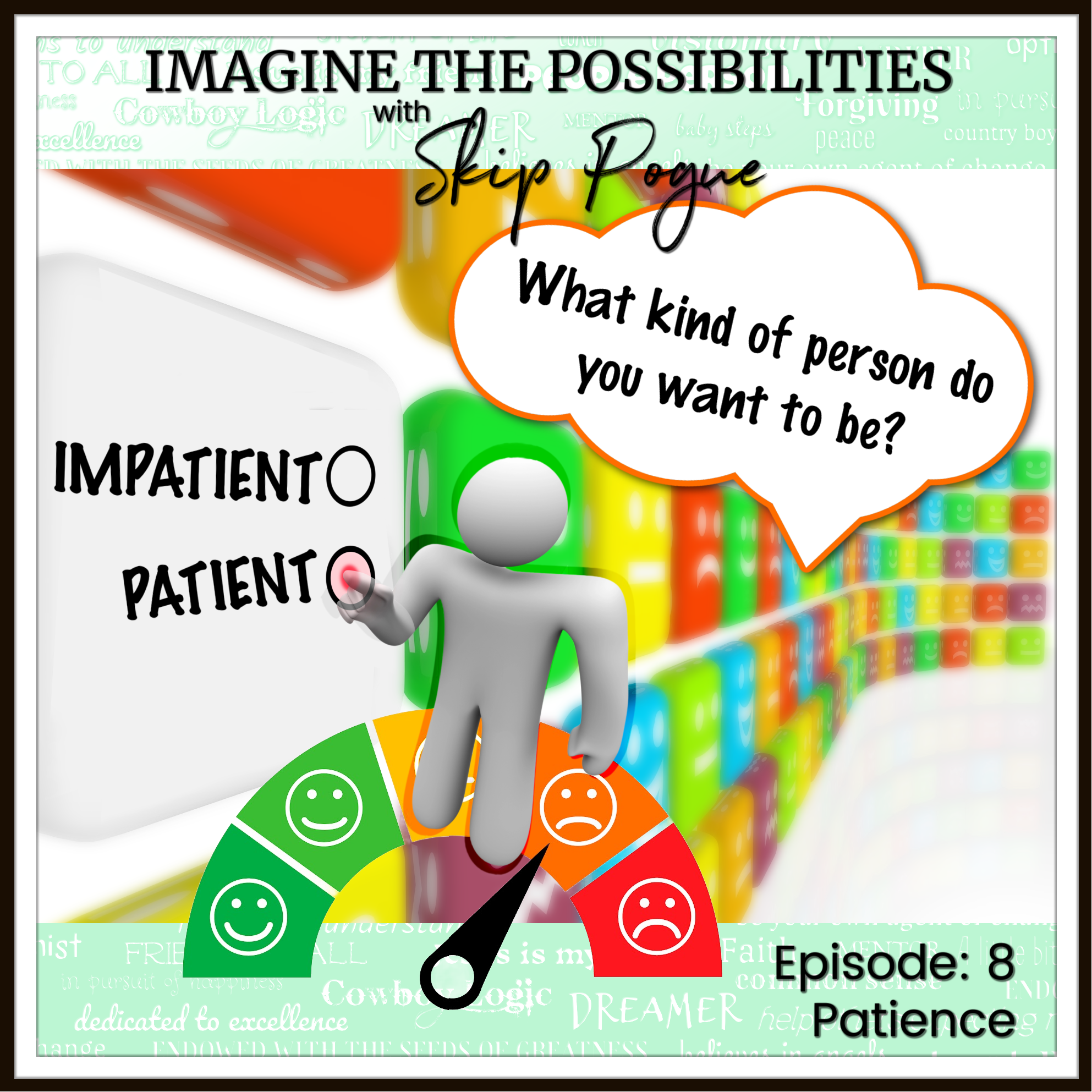Success is often seen as a destination, but in reality, it’s a journey filled with unexpected turns. In this episode I share my personal story of striving for success, believing that becoming a manager was the only path forward. After years of preparation, a failed job interview left me feeling devastated. But that setback led to an unexpected opportunity that changed my career and perspective on success. Join me as I reflect on the lessons learned, the twists and turns of my journey, and how success is about growth, adaptability, and embracing new possibilities.
View Full Transcript
Episode Transcript
[00:00:13] Hello and welcome to Imagine the Possibility. My name is Skip Pogue. This is season two, episode six, and it's titled Success.
[00:00:24] It's a journey, not a destination.
[00:00:27] I want to talk about success and what success is.
[00:00:32] When I first started working at IBM, I started out on assembly line, and I actually worked on that assembly line for 10 years. And then I got the opportunity to move out into the field as what IBM called a customer engineer.
[00:00:49] It's a person that works when a system like a typewriter, a dictating machine, electronic typewriter, whatever fails, they're the person that goes out and takes a service call. And being it was IBM, we always wore a suit, white shirt, tie, and all that. But anyway, during that period of time, I really enjoyed what I was doing. And I got it in my head that the only way I could truly be successful was if I became a manager.
[00:01:27] So I was remote to our branch office. I was about 60, 70 miles from the branch office in a resident territory is what they called it. So I worked out of my house. But the branch gave me plenty of opportunities to come down and work in the branch, both from a customer engineering perspective and also when they had a field manager. After a few years, when a field manager, which was what my manager was, left on vacation for a couple weeks or had something they needed to do, they would call me and have me go into the branch office and work as a field manager. So they were kind of, I felt, grooming me for a management position. And I had always thought that for me to truly be successful, I had to become a manager.
[00:02:18] So I had worked at trying to see what managers did, and being able to go to the office and do that for a week or two at a time was really great because it gave me a lot of insight into that. So I started preparing myself to be a manager and now being field manager. And after about five years in the field, I got a call one day and it was my manager. And he said, I got an opportunity for you.
[00:02:50] There's a field manager position open and I think you are a good candidate for it. So I was like, all right, this is success. This is my goal. And so he told me where it was and everything. And he said, you need to fly out there, meet with the branch manager and talk to him for a job interview. And I said, okay, that's good. And I said, anything I need to know in particular? No, you'll be fine. Everything will be great. So I did. I flew out there. I had what I thought was an excellent interview. Any Questions, anything, you know, wanted to know about my background, want to know where I wanted to be, and five years, all this. And that went really, really well. I was totally honest and felt like it was a great interview. So we shake hands, say bye. I go back to the airport, fly back to Kingsport, and go back to my house, and I think everything went fine. They asked me in the branch. My branch manager and my field manager both asked me, how'd the interview go? I said, went great. I said, really went great. I said, I think I got the job. Hope you're ready to let me go.
[00:04:02] Because I had always believed, like I said, the only way I was going to be successful in life was if I became a manager. So I go home, about three days goes by, and my branch manager calls me or my field manager calls me and wants me to come to the office. And I thought, yeah, this is it. I drive back down to Kingsport, go into office, close the door, sit down, and he starts talking to me. And I could tell by the way he was talking that he didn't have good news for me. So after a little bit, he finally got around and he said, I got to tell you, they picked somebody else for the job.
[00:04:42] Now, I was. How do I say that? I was devastated.
[00:04:48] I don't think Tony knew I was, but I was. And I really didn't know what to say. So I left the branch office and drove home. And like I said, it's about 60 mile drive. So I had about an hour and something in the car. And I was truly upset by the whole thing. I thought, if I can't get that job, I did everything I knew to do. They'd been grooming me for the job and everything else. I can't get that job.
[00:05:17] I'm a failure.
[00:05:20] And I spent. And I'm sure Brenda put up with me.
[00:05:28] I'd say something different, but with me whining around and kind of in a bad mood for a couple weeks, I worked. I went out, took calls and did what I had to do. But I was really, truly upset by the whole thing and didn't handle it well.
[00:05:47] Maybe I just don't. Maybe I didn't at that time in my life handle rejection well. I don't know. But I didn't handle it well.
[00:05:55] I guess if you asked me to describe where I was, I was devastated. I felt like a failure. I was disappointed.
[00:06:06] It was definitely a setback, and I really didn't know what to do.
[00:06:13] I mean, it looked like it had removed any possibility of becoming A manager from it was now. I consider it outside my wheelhouse now. I guess that's the way to say it. After a couple weeks, I got to thinking about it, and about the end of the second week, I got a very unexpected job offer. It had nothing to do with management, but I'd had a field manager that I worked for for the first couple years I was at the site or in Kingsport, and he had left, and I didn't really know where he went, but we had stayed in touch a little bit, messaged back and forth every once in a while. And I knew he went to Boca, but I didn't know what he was doing. Well, he was working in a support center that was supporting IBM, had announced new personal computer, and he was working in a support center that supported the personal computers. And he had talked to his boss and said, I got a guy that I believe could do this and would really be good at it. And so his boss told him, so contact him, contact his manager, see if he can come down here on a temporary assignment. So he did. So then my boss calls me and he says, I got this job. They want to look at you for this job in a support center. Well, I really hadn't worked in a support center, but I knew customer support and I felt like this would be interesting. So I flew to Boca Raton, Florida, reported to found Larry. Larry introduced me to his manager, and the person I was going to report to was his boss for the time being, and told me about the job, all about it, and how this was a training opportunity and stuff. So I spent four months in Boca and I told this story in another podcast about Bob, the manager I was reporting to, becoming a mentor for me.
[00:08:34] And I also told the fact in another podcast that I did get the job. So I went and took on a whole different, unexpected career path.
[00:08:46] And I did a really good job. And matter of fact, while I was in the support center, I became a team lead.
[00:08:54] I did business shows. IBM had a business show group out of Boca that supported the PC products. And. And they did business shows all over the country. And a guy I'd never met, but evidently had been watching me for some reason called my boss then and told him, said, I want this guy to do business shows for me. And he said, the first business show I want him to do is in the United States, but he's gonna be gone for over a week because the state it was in was Hawaii. I made my first trip to Hawaii doing a business show, and it was really interesting and I liked it. I knew about all the products because of being in a support center. So it was easy to talk to people about them. So anyway, I did business shows for almost four years. So that was unexpected. That was a.
[00:09:50] I learned a lot from a customer relationship, opportunities and things about marketing things doing the business show. So after that, I did a bunch of other stuff. I stayed in the support center, but I moved around a lot in different positions and different things. None of them were management positions. But I kind of got this thing that maybe I was wrong.
[00:10:16] Maybe the fact I thought the only way I could be successful was by becoming a manager wasn't something I really thought of on my own.
[00:10:25] That maybe I'd been influenced by other people that were managers. And they were telling me that because maybe they believed like. Or maybe they convinced me to believe like they did, that management was the only career path, successful career path you could have.
[00:10:43] So I went on and I guess I changed some of the things that I was doing and lost.
[00:10:55] I won't say I lost focus. It was still on my list, but it wasn't at the top of my list to become a manager. But it wasn't something that it wasn't. I knew then that it wasn't the only way I could be successful. I could be successful doing this other stuff that people wanted me to do and that I could learn from and grow from. Even when I failed, I could grow from it. I could get better at stuff. So I started paying more attention to those things. I spent about three years, IBM, started a business unit, I guess, called IBM Desktop Software. And I got selected as one of the people to move over into desktop Software. As a matter of fact, the first meeting we ever had was at comdex. We all were at COMDEX in Las Vegas. And the president of the division invited the people that were there out to dinner. And when we got to this nice Italian restaurant, had a wonderful dinner.
[00:12:07] I sat about six people down from him, and he got to talking about his vision for where we were going and everything. And I was just listening to it. Some of the other people were talking about this and that, but I wasn't saying anything. And finally Bernard asked me, don't you have anything to say? And I said, well, I have a question, more than something to say.
[00:12:36] And he said, what's your question? And I said, listening to everybody and knowing some of the people.
[00:12:44] Is everybody at the table a manager except me?
[00:12:50] And he said, yeah. And I said, okay. Then the first suggestion I make is that you're Going to have to get a bunch more of me if you're going to have all these people be managers. And he just laughed. He said, yeah, that's true. I need more people like you. Didn't say, I need more managers, more people like you. And I said, okay, long as I'm not in this thing by myself and going to report to 20 different managers, I'm fine. So after that, Fernand kind of, when he had a question about certain things, he would come ask me about it, which I thought was odd, but I've learned over that time period that it wasn't odd.
[00:13:33] I was honest and he might not have wanted to hear everything I said, but I told him how it was. How's that? And I guess he appreciated that because we actually became pretty good friends.
[00:13:45] But when desktop software IBM decided financially it wasn't as good a plan as they thought it was, and they decided not to do it. So it closed up. And out of the blue, I got another opportunity and I moved over to another group as a marketing programs manager. And I spent about four and a half or five years doing that. And I reported to the second great manager. First great manager I had was Bob DeVoe. And I reported to another manager that was really good. And I reported to him several times, Fred. And then the manager I'm talking about now was really good. Those three managers, Nancy was the third one. Those three managers taught me more about how to accomplish things, more about how to treat people, how to get the most out of people that you worked with.
[00:14:49] Not nothing about how to be a boss, everything about how to be a leader.
[00:14:55] So during the period of time that I spent, the rest of the time I spent with IBM, having those three people really helped me learn. And I also started realizing more and more that because I had all these opportunities for growth and learn stuff, I started realizing that what I was thinking about, success is not necessarily a being a manager. A title or promotion is not what success is. Success is what you want to do, what you feel energized to do. If you get the opportunity to do something that you're.
[00:15:42] That's really what I. All of a sudden I changed my whole perspective, changed about everything.
[00:15:50] So there was times even. Even though I had these good people on my side, there was times I struggled with failure.
[00:16:01] It happened.
[00:16:03] It's part of growing.
[00:16:06] If we're given something that's really challenging and we do it okay, but we're not successful, we fail at it. That's okay. Because I discovered that managers, good managers, are not Going to chop your head off.
[00:16:27] They may ask you about it, they may talk to you about it, you know, and, and get you to understand, oh, you, you did 99% of it exactly right. You just missed it a little bit, you know, and convince you, make you understand that it doesn't diminish your value because you fail occasionally.
[00:16:48] It doesn't mean it doesn't diminish your value as a person, as an individual, as an employee, as a leader. It doesn't dimension, it doesn't do that, it doesn't decrease your value from that point. I spent 30 years with IBM. Actually, I spent 28 years with IBM.
[00:17:14] I got an offer at the end of my 28th year. IBM had started downsizing, rightsizing, whatever sizing you want to call it. And I got asked if I wanted to take a bridge to my retirement, bridge to 30 years. And I said, tell me about it. And as you hear, sometimes I got an offer I couldn't refuse. So I took the offer. I left IBM for just a little bit. And then I got a call from a friend, a manager friend, and he asked me what I was doing. And I said, well, to be honest with you, I'm about ready to start looking for a job.
[00:17:59] I'd been off work for probably, I don't know, three or four months, maybe longer than that. But anyway, I decided, my wife and I decided, Brendan and I decided together that I probably needed to get out of the house.
[00:18:13] So I was going to look for a job. Well, Jim said, I got a job for you. I need a marketing guy, a marketing program guy to come over and help me build up some stuff with IBM's educational group. And I said, okay. And he said, when can you start working? I said, when do you want me starting? He said, Monday, okay. And I said, yep, Monday's great. And he told me what he's going to pay me. And I said, that's great. I. I'm ready. So come Monday morning, I put a suit on and off I went again. I worked for Jim for about a year and we got everything the way he want running, the way he wanted it running and everything. And I said, I think, you know, I'm about to work myself out of a job here.
[00:19:01] And he said, well, that's okay. And I said, and I said, well, it might be for you, but, you know, I don't think it is for me. And he said, he said, you need to call. He gave me the guy, and I knew who he was. He said, you need to call him. He's got a job for you. And I said, really? And he said, yeah, really. And he said, I was going to talk to you about it and tell you that, you know, if that's what you want to do, you can take it right now. He said, we're close enough to be where we need to be, that you've got us, you've got everything done I want you to do. So he said, you're free. You're free agent. So I said, okay. So I did. I went to another job and I worked in that group for about a year.
[00:19:42] And the same thing happened, except this time I really didn't have a job.
[00:19:49] And I was okay with that. I said, it's okay.
[00:19:52] I was doing consulting work for IBM. So I'm like, it's okay. I said, I'm just going to relax a little bit. So I did. And then about another. I don't know, I relaxed for about three or four months. It's just not a good thing. Sometimes when your spouse is used to you not being there all the time and all of a sudden you're there and you want to make suggestions about how to do stuff better or something. Anyway, I was about ready to start looking for a job again, and another friend of mine called me and he said, what are you doing? I said, I'm about ready to get a job.
[00:20:32] And this was on a Friday. And he said, I got a job for you. And I said, really? And he said, yeah. And he said, let me tell you about the pay. And I said, okay. So he told me what the pay was going to be. And I was like, that's really great. That's good. I like that. And he said, okay, so here's a job. And he told me about it. It was a new PC product, a RISC PC that IBM was going to announce. And he said, I want you to do some marketing programs with me. And I said, okay. And he said, there's only one problem. And I said, what's the problem? And he said, this was on a Friday, remember? He said, you have to be in Austin, Texas, Monday for worldwide training on the product. Said, it's two weeks.
[00:21:19] And I said, hang on a minute. And Brenda knew who Jim was. And I spread Jim's on the phone, offered me a job starting Monday. And I said, and I told her how much pay. And she said, take the job. And I said, well, I got to go to Austin on Monday and I'm going to be gone two weeks. And she said, take the job. And I said, I guess you Heard Brenda, Jim, she said. And he said, yeah. And I said, so I guess I'm working for you. And I. I said, but I don't know how to cover my expenses and stuff. I said, you want me to use my personal card and do that? He said, no, no, no. He said, I worked it all out. He said, I already got your airplane ticket. I said, what do you mean, you already got my airplane ticket? And he said, well, I was hoping. And I said, well, you got your hope fulfilled there. And he said, so it should be there this afternoon, and if not, it'll be there in the morning. And I said, okay. So sure enough, FedEx next day, showed up the next morning with my airline ticket. And while we were talking, he says, as far as your expenses, he said, just keep track of them and pay cash for everything and then just turn in your things. And I said, you want me to pay cash for everything? Oh, he said, not your money. He said, when you get to Austin, he told me who to go see. And he said, since you don't have an American Express card. And he said, I'll get you one of those. But he said, they're going to give you cash so you can pay cash for your hotel and meals and everything. And I said, okay. And he said, if you run out, just go see them again. They'll give you more cash. And I was like, okay, this is really good, right? And so anyway, I did that, and one thing led to another, and during this whole time, I was learning so much different stuff about different products, different ways to work with customers, different ways to do things, better ways to do things. And I was falling flat on my rump every once in a while because I didn't know how to do something. And I felt sometimes like I was in over my head. But even when I failed, I knew I was learning stuff from it. That failure was part of. Failure is part of growing. And because of that, I didn't have the fear of doing it. Nobody jumped on me and said, you didn't do that, right? And they understood what I was going through, so it was fine. And I think when we look at the bigger picture of things, we've got to understand that embracing moments of failure is part of that big picture.
[00:23:57] The opportunity, the ability to. To not feel bad about it, and the opportunity to grow in an area you're obviously not good at is tremendous. So it was cool after I did that for a little while.
[00:24:17] I had worked this period of time from when I left IBM until my next job was probably Four years when I went through all that.
[00:24:31] So I'm done with this marketing programs for this PC product and everything and everybody's happy and I'm wondering what I'm going to do next.
[00:24:43] And a guy calls me.
[00:24:49] IBM's got a help desk in Atlanta. It's not your normal help desk. It supports all kinds of customers, direct customers, like I can't, I don't feel comfortable. But like a hamburger chain and bank and this net and they have help desk divided into sections where if the hamburger chain wants to call and ask a question about their terminals and stuff, cash registers and things, they can call it a ring at those certain group of desks. So I get offered this job and it's not a, it's a direct offer from IBM, it's not through anybody.
[00:25:36] And it was a nice offer and I wanted to take the job except there was one problem. I was retired IBMer and I couldn't go back to work at that time. They wouldn't let you if you were. And I was actually drawing my retirement. They wouldn't let you draw retirement and work for the company for obvious reasons I guess, but wasn't too obvious to me. But anyway, I was like, I can't do this. So I go in and I knew the director of the group, the IBM director of the group because it was with a contractor. Well, it wasn't with a contractor yet. So I go see Frank and I tell him, I show him the offer he made me and I said really nice offer. And I said there's a problem. And he said I already know. He said I forgot. He said you're retired, right? And I said yeah, and I can't work under this. And he said come with me. So he takes the offer letter and me and we walk over to this guy that works for a company that a lot of the help desk analysts and stuff are contracted through. I didn't realize they weren't all IBMers. They were contracted through his company called at the time it was called Interim Technology.
[00:26:46] And he hands my letter to him and tells him, he said everything that's on that he get now on that letter was five weeks of vacation because that's what I got when I left IBM was 5 weeks vacation, good salary, this and that, benefits and stuff. Now I had IBM benefits. So I told the guy, I said I don't need your benefits. I got good benefits already and I'm not losing those benefits, I'm not messing with that. So I said I don't need them so you can Put some more money in the job and keep your benefits. He said, okay, we can do that. And he said I can hire. So yeah, I'll take care of it. Told Frank because he didn't want the guy from IBM being mad at him. So he hired me on the spot, no questions, got the offer letter and he said, I'll take care of all this. The there was one really tricky part of it that came up later on was their system because most of their people were contractors. Their system had no way to allow me to take five weeks vacation, two weeks, that was it, two weeks. And I said, that's not going to work. So several people, including the guy that ran the company who I met, who was a nice guy, decided that I'd just take off time and that they would just make sure that I got credit for it some way. I don't know, didn't want. I told myself I don't want to know because it sounds like I'm doing something wrong here. They said, no, no, no, we'll take care of it. So anyway, I got. When I wanted to take vacation, I could take vacation. So anyway, I digress.
[00:28:21] So I'm working for them and I'm in a.
[00:28:27] Was a team lead, a supervisor position, I guess because they had several supervisors. So about a year and a. Worked for him. About a year, yes, year and a half maybe. And the site manager for interim happened to be a friend of mine and he decided because he was a bit older than I was, he decided he wanted to fully retire.
[00:28:59] So he told interim that and he told them, he said I got the guy to take my place. He said he can hit the ground running, won't have any problem at all.
[00:29:08] So my current boss from interim came over to me and said, need to talk to you. And we went, got in office and sat down. He said, john's leaving. And I said, yeah, I knew John was leaving. He said, so unless you don't want it, you're the new manager for the site now. Site had about 200 people somewhere in that name that range working for them. Had eight supervisors and I don't know how many, I don't remember now how many team leads. 20 something and about 200 employees or more maybe. But anyway, I said, he showed me the figures. I said, yeah, I'll take it 30 plus years.
[00:29:56] I'll get the dates and figure it out. But 32 years later, didn't have any inkling. Management was not in my goal anymore.
[00:30:11] My goal really.
[00:30:12] I felt like I was successful already. I didn't need a title.
[00:30:17] That was the biggest thing. And I think a lot of people need to get to that point where it's not the title, it's not the raise or the promotion or whatever you call it.
[00:30:29] Success is what we believe in. It's in us. It's what we. When we feel like what we're doing is exactly what we're supposed to be doing.
[00:30:43] Now, I realized through this whole thing, one thing, because when I didn't get that job and I talked about I was PO'd, I was a little bit aggravated with God. It took me about two weeks, same two weeks that I spent about not getting a job with. I was aggravated with God. And so I had.
[00:31:09] I've talked about. I never have been good at praying, but I've been really good at having conversations with Jesus. So Jesus and I had several conversations. You might call them, come to Jesus meeting. Anyway, during one of those conversations, one or both of us, more likely both of us reached an agreement that I was going to quit whining about this and move on.
[00:31:33] He was taking care of his part, and I'm taking care of my part. Well, when I got the manager's job, all of a sudden it dawned on me that I was manager.
[00:31:47] And I realized back when I was aggravated about not getting that manager position and Jesus said he'd take care of it, that I needed to trust God's timing and his plan because he had control when I didn't. So once I realized that, I kind of got a lot better about it. So I really. I had goals and aspirations, but, you know, they were specific, but they were based on what I felt like success was to me.
[00:32:35] Through this whole thing and getting to that management position, I realized that by trusting God's timing and plan, things would work the way they were supposed to work. That if we look at success from our own personal feelings of success, that the path we take, that adventure we're on, that journey may not be exactly the way we expect it to go. It may not happen in, okay, I'm going to do this step, this step, this step, and this step. It may be that you, you do the first step, the third step, go back to the second step, and move forward to the fourth step. So it's not really a pathway. That's just a straight line. It's a curvy road you gotta, gotta work on. And I think one of the big benefits I had, I think all that personal growth that I had from doing all those different things gave me, I was prepared and all those things I learned aligned with this new opportunity.
[00:33:58] And each opportunity I had, I was always.
[00:34:02] Before I was striving to do something, I was always doing things to prepare for whatever opportunity came up. Instead of saying, I'm going to grab that ring, I waited for the ring to come to me. The opportunity came, and I had done all the preparation for that opportunity without knowing it.
[00:34:25] That was important, and it made me discover that.
[00:34:32] I guess you got to think about this in this way when you think about what, about success.
[00:34:41] Because even to this day, even with this podcast, I feel like I want it to be more successful. But I'm successful because I think I'm helping people. I know I'm helping people. And that was the intent of the podcast. So it's easy to go through that and think about, okay, what are you going to do?
[00:35:03] I think we have to look and focus on our personal nature of success, on the personal nature of success and the roles of failures. As a teacher, we can't just say, okay, we're not going to be or not a success because we didn't make a manager, I didn't become a manager, and I'm not successful.
[00:35:29] It's like if we understand that our success is not valued personally in dollars and it's not valued in job titles, it's valued in what we believe is success for us, our personal success.
[00:35:51] And that's where we've got to get to. And it's actually easy.
[00:35:59] Once we let go of the thing of I gotta be a manager. Once we let go of that thing that's sitting out there, that's a very specific thing.
[00:36:09] Gotta be a manager. Once we let go of that and focus on how do we. What do we. We want, what is, what is. Define success for yourself.
[00:36:22] You know, I can look and I know some. Some very successful people.
[00:36:28] I would almost each one of those people, at least the people I know, their journey was a very curvy path. It wasn't a straight road. It didn't. You can't just. And I'm going to. I've talked about goal setting, and there's nothing wrong with you, 100% need to have a goal.
[00:36:50] But maybe instead of a job title, you look at what you feel like, is personal success, what makes you happy?
[00:37:03] What do you want to do for the rest of your life?
[00:37:09] Maybe that's the way to look at it. You have to focus on the personal nature of success.
[00:37:17] You have my permission, and I'm sure you can get your own permission to redefine what success means to you.
[00:37:30] Because the job title, the money, and all the other things that go with it won't make you happy if it's not what you truly want.
[00:37:45] And I think the other part of that goes back to the failure thing. And I've said this, I don't fear failure. I haven't for a long time.
[00:37:55] Just embrace failure.
[00:37:58] Embrace it as part of the learning process rather than something you need to be afraid of.
[00:38:05] If you have a spiritual nature, you're a Christian or believe in a higher power, understand that everything, especially with God, God's timing is perfect.
[00:38:22] And talking with God, if you're feeling impatient or lost because you don't feel like you're moving forward enough, talk about it.
[00:38:33] Talk to God about it. Talk to a friend about it, somebody you trust, you know, say, hey, I feel like. Because when you look at baby steps, you're not always going to be moving forward. I'll tell you that right now. Like I said, there was times I went from A to D and then back did B and C. Sometimes I had to go back to move forward. How's that? And once you understand that's just part of your journey, then moving backwards, not a bad thing, you can deal with it.
[00:39:07] I think we have to understand when we're dealing with success and failure that they're fluid concepts and in our case, they're constantly evolving as we grow and learn.
[00:39:27] And we need to understand that in our mind. We don't need to get locked in. Oh God, I said it. I'll probably say it again. We need to always be moving forward. But like I said, sometimes taking a step back is actually a step forward. Makes sense. Does to me. Each experience, whether we perceive success or failure, it's really just a stepping stone toward becoming who you're meant to be.
[00:40:04] As you've learned things over the years.
[00:40:07] You have to realize success is not just about what you've achieved in a specific time frame, but about how we grow and evolve and learn through all the ups and downs we experience.
[00:40:23] It's that simple.
[00:40:25] If we really think about stuff, that's what we need to get in our head.
[00:40:31] And don't let one failure or one trial define who you are.
[00:40:39] You got to look at everything you do as part of a larger picture, something that adds to your overall wisdom and experience level.
[00:40:49] If you think about it, doing that will help you stay grounded during both your high points and also your moments of disappointment.
[00:41:02] Another thing you got to remember, and took me a while to learn this is you can't have A real rigid view of success and failure puts too much pressure on us.
[00:41:18] If you feel like you always need to succeed, the least little setback aggravates you.
[00:41:27] Like I said, you've got to remember that success is a journey.
[00:41:32] And that journey shaped by lessons we learn and the way we adapt. If we fail.
[00:41:41] Your journey doesn't fit in a box. It doesn't have to be well defined by being fluid. Things will change all the time. And that's the way life is, isn't it? The biggest thing, I think, is to find success. I think as I wind this thing down, I think you have to, you have to say, or I have to say, when it comes to success, define success on your own terms and embrace the fluidity of life's path.
[00:42:20] You can define success on your own terms. And once you do that, you also need to embrace the fact that you're going to go through ups and downs as you travel life's path. No doubt about it, just that way, the way it is.
[00:42:38] So I think that I'm ready to close because this thing's. I've Talked for over 45 minutes now. I want to wind down. I want to tell you something and hang on to this. I'll figure out how to get you a copy of it. I'll put it up on the website or something.
[00:42:59] It's something I wrote. It's a quote for me and I put it on the website. You can go over the website and download it, use it, keep it somewhere, fold up, put in your bill, fold, stick it to your mirror, be inspired by it, because I think it's inspiration. But here's the thing I want you to think about every success, every failure, every time we stumble, every time we did our best, every time we completed a task, or every time we gave up too soon.
[00:43:37] Those things are what got us to the point where we are today.
[00:43:42] We learned from each of them. They made us better.
[00:43:46] They are what gives us the power to keep moving forward.
[00:43:52] So in closing, just think about stuff. Your success, failure, growth and perseverance are what gets you where you need to go.
[00:44:01] Your ideas of success, your personal ideas of success, failure, growth and perseverance are what get you to where you need to be.
[00:44:13] Setbacks and moments of giving up are an integral part of our overall development. We all do it. I did it forever.
[00:44:24] At least it seemed that way.
[00:44:27] Everything's a lesson.
[00:44:30] And every step we take, whether it's forward or backward, is part of the path toward becoming stronger and more capable.
[00:44:40] Remember, failure isn't a dead end. It's just a necessary part of growth.
[00:44:47] It's just as important as the successes and the times we've done our best is good enough.
[00:44:59] View your own journey as a collection of moments, each of them contributing to your view of success, to your story of life.
[00:45:15] You are you are going to accomplish remarkable things.
[00:45:20] You're always growing, always learning and always moving forward even when it doesn't feel like it.
[00:45:31] So just keep that in mind.
[00:45:35] Here's what I'd like you to do.
[00:45:38] Take a moment to define your own path and then share it with someone who's on a similar journey.
[00:45:45] Let's continue to learn and grow together.
[00:45:50] Thanks for listening.
[00:45:54] Remember the future belongs to you.
[00:45:58] I wish you much success.
[00:46:01] Stay humble, be kind, love deeply and laugh often. I hope you have a super day and I pray that God blesses you in a super way.
[00:46:15] Thanks again and God bless.






